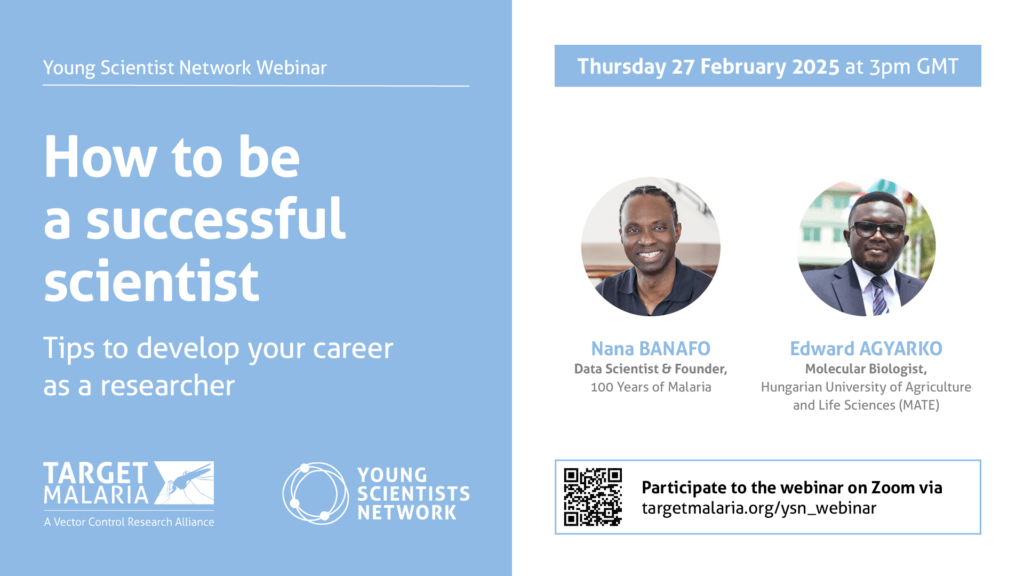Malaria, machine learning, and the power of collaboration, a discussion with the Young Scientists’ Network

I recently had the honor of speaking to Target Malaria’s Young Scientists Network at their quarterly webinar. This was an opportunity to share my passion for malaria research and education and offer advice to members of the network on how to achieve their professional goals. Together, we pondered over what success means to a scientist and what levers to put in place for a fulfilling career in the world of scientific research.
During the webinar, I emphasized a truth I’ve learned through many years of experience: to succeed as a scientist, you need an intrinsic motivation for your chosen field of work. Science can be an arduous journey; there are long nights in the lab, countless revisions to medical documents you’ll write, and sometimes monotonous data analysis. But when you witness how your findings can improve lives, it all becomes worthwhile. Over time, you build the “tools of the trade”—from technical skills like benchwork and data analysis to softer skills such as communication and leadership. This will lead you to great success.
My collaborator Edward Agyarko also emphasized that motivation lies at the heart of all scientific pursuits. He stressed the importance of knowing why you are doing something and ensuring that reason aligns with your core values—warning that if external rewards like prestige or recognition are your only motivators, you may feel unfulfilled when the work becomes tedious or lonely.

Edward also spoke about the importance of cultivating consistent habits that support long-term growth as a scientist. In his view, staying current with the latest findings not only sharpens one’s technical knowledge but also sparks new ideas and connections that can enrich ongoing work. He emphasized that writing—even when it’s not for publication—helps clarify thoughts, track progress, and build confidence as a communicator.
Collaboration, I stressed, is equally crucial. While bench scientists often work in isolation, clinical research demands teamwork. In my experience, meaningful outcomes come from partnering with computer scientists, policy experts, and regulatory professionals. No single discipline can eradicate malaria alone; combining diverse skill sets is key.
I also shared the importance of clear communication, especially through writing. Understanding your audience is the first step to success. Write repeatedly, revise often, and value feedback. Conferences, likewise, offer an excellent platform to present ideas, gather insights, and refine your message. A good scientist can be brilliant in the lab, but without strong presentation skills and a willingness to engage in dialogue, the impact remains limited.
“The right mentor wants to challenge you to go further than where you are.“
Nana Banafo
When I accepted the invitation of Target Malaria’s Young Scientists’ Network to speak at this event, little did I know how much their enthusiasm would reignite my own commitment to the fight against malaria. This reflection is not only about our conversation, but also about my personal journey with the 100 Years of Malaria, and the lessons I hope to pass on to emerging scientists and advocates.
When I founded 100 Years of Malaria in 2016, I envisioned an initiative that will address the unique challenges of malaria awareness, especially in underserved communities in sub-Saharan Africa. From the very beginning, our ambition went beyond merely raising awareness. We sought to combine deep historical analysis, hands-on community engagement, and state-of-the-art research tools to create a tangible impact. By forging local partnerships and embracing data-driven interventions, we continue to refine our approaches and address emerging challenges on the ground—showcasing how research can evolve into meaningful action.
Armed with education, technology, community outreach, and relentless perseverance, we can push closer to a future free from malaria. If you’re passionate about joining our efforts, 100 Years of Malaria runs an Ambassador Program that enables students and professionals alike to champion malaria awareness in their own communities. To learn more or get involved, visit our website : https://www.100yom.org/ambassador.
About the authors
Nana Banafo is an author and founder of 100 Years of Malaria, a data science research project examining both the historical roots of Malaria. Nana is also a researcher with over 15 years combined experience in Chemistry, Patient Safety, Quality, Regulatory Compliance. He has held various positions in engineering management and general business administration in the pharmaceutical, medical devices, and electronic materials industries. He is from Ghana and lives now in the US.
Edward Agyarko is a Doctoral Researcher in Biotechnology at Hungarian University of Agriculture and Life Sciences – MATE in Gödöllő, Hungary. A member of the Ghana Science Association, Edward has mentored several science students as an academic advisor. Earlier in his career, he was a lecturer and a researcher at the Family Health Medical School and the Anglican University College of Technology, both in Ghana.
